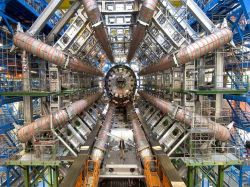Sussex super computer could help solve mysteries of the Universe
A high-performance computer at Sussex could help to solve the mysteries of the Universe.
 The ATLAS experiment at CERN's Large Hadron Collider in Geneva. Photo courtesy of Maximilien Brice
The ATLAS experiment at CERN's Large Hadron Collider in Geneva. Photo courtesy of Maximilien Brice
Sussex will in April become the 18th UK institution to join Grid PP, which, with the processing power of 20,000 PCs, is the UK’s contribution to a worldwide grid of shared computer resources.
The grid was set up to handle the vast volumes of data being created by experiments such as the Large Hadron Collider (LHC) at CERN, near Geneva in Switzerland.
The LHC is aiming to re-enact the birth of the Universe via the head-on collisions of protons at extraordinarily high energy.
Sussex’s high-performance computer (named feynman), which came into use in November 2011, will now join the effort by connecting and sharing computing resources with different organisations in different locations worldwide.
Feynman is currently classified as ‘Tier 3’ and is used locally by researchers in Sussex's Experimental Particle Physics (EPP) group.
However, following a £33,000 grant from GridPP obtained by Dr Fabrizio Salvatore from Sussex’s EPP group, it is being upgraded to a ‘Tier 2’ system, making it powerful enough to join the so-called ‘SouthGrid’, which includes institutions such as Oxford and Cambridge.
The IT Services Research Support team (Jeremy Maris and Tom Armour) and EPP’s Linux System Administrator (Emyr James) are currently working to prepare the system to be fully integrated in the grid within the next few weeks.
Dr Antonella De Santo is from Sussex's EPP group and is leading the team's involvement in the ATLAS project, one of two multi-purpose experiments taking place at the LHC. She said: "In this era of high interconnectivity among researchers, investment in grid computing can only increase Sussex's capability to deliver world-class research."
